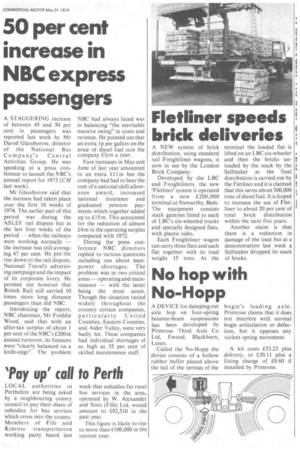50 per cent increase in NBC express passengers
Page 23

If you've noticed an error in this article please click here to report it so we can fix it.
A STAGGERING increase of between 45 and 50 per cent in passengers was reported last week by Mr David Glassborow, director of the National Bus Company's Central Activities Group. He was speaking at a press conference to launch the NBC's annual report for 1973 (CM last week).
Mr Glassborow said that the increase had taken place over the first 16 weeks of 1974. The earlier part of this period was during the ASLEF rail dispute but in the last four weeks of the period — when the railways were working normally — the increase was still averaging 47 per cent. He put the rise down to the rail dispute, National Travel's advertising campaign and the impact of its corporate livery. He pointed out however that British Rail still carried 10 times more long distance passengers than did NBC.
Introducing the report, NBC chairman, Mr Freddie Wood, said that with an after-tax surplus of about 1 per cent of the NBC's £200m annual turnover, its finances were "clearly balanced on a knife-edge". The problem NBC had always faced was in balancing "the inevitable massive swing" in costs and revenue. He pointed out that an extra I p per gallon on the price of diesel fuel cost the company £3/4m a year.
Fare increases in May and June of last year amounted to an extra £11 m but the company had had to bear the cost of a national shift allow ance award, increased national insurance and graduated pension pay ments which together added up to £15m. This accounted for the reduction of almost £4m in the operating surplus compared with 1972.
During the press conference NBC directors replied to various questions including one about manpower shortages. The problem was in two critical areas — operating and maintenance — with the latter being the most acute.
Though the situation varied widely throughout the country certain companies, particularly United Counties, Eastern Counties, and Alder Valley, were very badly hit. These companies had individual shortages of as high as 35 per cent of skilled maintenance staff.




























































































